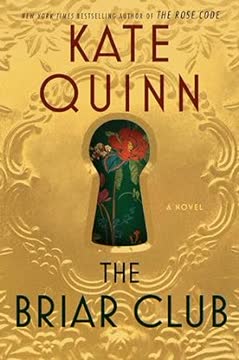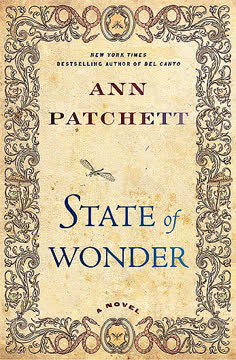Plot Summary
Mysterious Spring's Healing Waters
In 1906, George Clatterbuck discovers a sulfurous spring on his Kentucky land, initially fearing it as a bad omen. However, the spring miraculously heals his livestock and his ailing daughter, June. The news spreads, attracting people seeking cures. A wealthy horse breeder, Lewis Nelson, builds the Hotel Louisa to accommodate visitors. The spring eventually dries up, and the hotel becomes a rest home for nuns, later transforming into Saint Elizabeth's, a home for unwed mothers.
Rose's Escape from California
Rose Clinton, feeling trapped in an unhappy marriage and newly pregnant, decides to leave her husband, Thomas, in California. She writes him a note and embarks on a cross-country journey to Saint Elizabeth's in Kentucky, a place for unwed mothers. Along the way, she grapples with her decision, the weight of her lies, and the uncertainty of her future.
Arrival at Saint Elizabeth's Haven
Rose arrives at Saint Elizabeth's, where she is welcomed by Sister Bernadette. The home is filled with pregnant girls, each with their own stories and secrets. Rose is assigned a roommate, Angie, and begins to settle into the routine of the home. She finds solace in the kitchen, working alongside the elderly Sister Evangeline, who has a gift for predicting the sex of unborn babies.
Friendship and Secrets Unfold
Rose and Angie develop a close friendship, sharing their fears and hopes for the future. Angie confides in Rose about her affair with a married man, while Rose keeps her own secrets guarded. Sister Evangeline reveals to Rose that her baby will be a girl, a revelation that Rose struggles to accept as she plans to give the child up for adoption.
A New Life with Son
After witnessing a friend's difficult labor, Rose decides to keep her baby. She marries Son, the kind groundskeeper at Saint Elizabeth's, to provide a stable home for her child. Son, who has long admired Rose, is overjoyed. They begin their life together, with Rose continuing to work in the kitchen and Son supporting her decision to stay at Saint Elizabeth's.
Birth and New Beginnings
Rose gives birth to a daughter, Cecilia, and decides to stay at Saint Elizabeth's with Son. The couple navigates their new roles as parents, with Son embracing his role as Cecilia's father. Despite the challenges, Rose finds a sense of belonging and purpose in her new life, surrounded by the community at Saint Elizabeth's.
Unexpected Visitor Reveals Hidden Past
Thomas Clinton, a man from Rose's past, arrives at Saint Elizabeth's, revealing himself as Rose's first husband. His presence uncovers a hidden chapter of Rose's life, leaving her daughter, Cecilia, and her husband, Son, grappling with the revelation. Thomas's visit is prompted by the death of Rose's mother, Helen, and his desire to inform Rose personally. The encounter forces Cecilia to confront the complexities of her mother's past and the impact of her sudden departure.
Lorraine's Friendship and New Roles
Lorraine, a pregnant girl at Saint Elizabeth's, forms a close bond with Cecilia. As Rose's absence leaves a void, Lorraine steps up to help in the kitchen, finding purpose and stability in her new role. Her friendship provides Cecilia with much-needed support and distraction from her mother's departure. Lorraine's presence becomes a comforting constant in Cecilia's life, as they navigate the challenges of growing up and facing uncertain futures.
Driving Lessons and Family Secrets
Cecilia's driving lessons with her mother, Rose, become a rare opportunity for connection and conversation. During these lessons, Rose shares glimpses of her past, including her love for driving and memories of her father. These moments offer Cecilia a deeper understanding of her mother, even as they highlight the emotional distance between them. The lessons become a metaphor for Cecilia's journey toward independence and self-discovery.
A Father's Accident and Revelation
Son, Cecilia's father, suffers a head injury, prompting a crisis that brings the family together. Cecilia's quick thinking and determination to help her father reveal her strength and resilience. The incident forces Cecilia to confront her fears about her father's mortality and her role in the family. It also highlights the emotional distance between Cecilia and her mother, as Rose's absence becomes more pronounced.
Thomas Clinton's Surprising Arrival
Thomas Clinton's unexpected arrival at Saint Elizabeth's brings a wave of emotions and questions. As Rose's first husband, his presence forces Cecilia and Son to reevaluate their understanding of Rose's past. Thomas's gentle demeanor and genuine concern for Rose's well-being challenge any preconceived notions of him as a villain. His visit becomes a catalyst for reflection and healing, as the family grapples with the complexities of love and loss.
Dinner with Two Husbands
A dinner at Saint Elizabeth's brings together Son, Thomas Clinton, and Cecilia, creating a poignant moment of shared history and unspoken emotions. The dinner serves as a reminder of Rose's impact on their lives and the enduring connections she left behind. As they navigate the awkwardness of the situation, the dinner becomes a testament to the resilience of the human spirit and the power of forgiveness and understanding.
Characters
Rose Clinton
Rose is a young woman who leaves her husband and travels to Saint Elizabeth's to have her baby. She is determined to start anew, grappling with her decision to keep her child. Her journey is marked by introspection and the search for a place where she belongs. Rose's strength and resilience are evident as she navigates her new life.
Son Abbott
Son is the groundskeeper at Saint Elizabeth's who marries Rose to help her raise her child. He is kind-hearted and has a deep admiration for Rose. Son's past is marked by a lost love, but he embraces his new role as a father to Cecilia, providing stability and support for Rose.
Sister Bernadette
Sister Bernadette is one of the nuns at Saint Elizabeth's who welcomes Rose and helps her settle in. She is kind and understanding, offering guidance and support to the girls at the home. Her warmth and empathy make her a comforting presence.
Sister Evangeline
Sister Evangeline is an elderly nun with a gift for predicting the sex of unborn babies. She becomes a mentor to Rose in the kitchen, sharing her wisdom and offering a sense of stability. Her deep connection to the girls and her intuitive nature make her a beloved figure at Saint Elizabeth's.
Angie
Angie is Rose's roommate at Saint Elizabeth's, a young woman with her own secrets and dreams. She forms a close bond with Rose, sharing her fears and hopes for the future. Angie's vulnerability and optimism make her a poignant character in the story.
George Clatterbuck
George is the farmer who discovers the miraculous spring on his land. His initial fear turns to wonder as the spring heals his livestock and daughter. His story sets the stage for the transformation of the land into the Hotel Louisa and eventually Saint Elizabeth's.
June Clatterbuck
June is George's daughter, whose life is saved by the spring. She grows up to become a local legend, living near Saint Elizabeth's and maintaining a connection to its history. Her presence is a reminder of the land's past and its enduring legacy.
Lewis Nelson
Lewis is the wealthy horse breeder who builds the Hotel Louisa to accommodate visitors to the spring. His vision transforms the land and sets the stage for its future as Saint Elizabeth's. His story is intertwined with the history of the spring and the hotel.
Thomas Clinton
Thomas Clinton is Rose's first husband, whose arrival at Saint Elizabeth's reveals a hidden chapter of Rose's life. His gentle demeanor and genuine concern for Rose's well-being challenge any preconceived notions of him as a villain. Thomas's visit becomes a catalyst for reflection and healing, as he navigates the complexities of love and loss.
Lorraine
Lorraine is a pregnant girl at Saint Elizabeth's who forms a close bond with Cecilia. Her friendship provides Cecilia with much-needed support and distraction from her mother's departure. Lorraine's presence becomes a comforting constant in Cecilia's life, as they navigate the challenges of growing up and facing uncertain futures.
Cecilia Abbott
Cecilia is the daughter of Rose and Son, who grapples with the complexities of her mother's past and sudden departure. Her journey toward independence and self-discovery is marked by moments of strength and resilience, as she navigates the challenges of growing up and facing uncertain futures.
Plot Devices
The Healing Spring
The spring discovered by George Clatterbuck serves as a catalyst for the story, transforming the land and the lives of those connected to it. Its healing properties and eventual disappearance symbolize the fleeting nature of miracles and the enduring impact of faith and hope.
Letters and Communication
Throughout the story, letters and notes play a significant role in revealing characters' inner thoughts and conflicts. Rose's unsent letters to her mother and husband highlight her struggle with honesty and the weight of her decisions, providing insight into her emotional journey.
The Hotel Louisa
The Hotel Louisa, later Saint Elizabeth's, serves as a central setting for the story. Its transformation from a luxurious hotel to a home for unwed mothers reflects the changing times and the resilience of the characters who inhabit it. The hotel's history and architecture add depth and richness to the narrative.
Naming and Identity
The act of naming, whether it be the hotel, the spring, or the characters, carries significant weight in the story. Names symbolize identity, connection, and legacy, influencing characters' perceptions of themselves and their relationships with others. The choice of Cecilia's name, in particular, highlights themes of love, memory, and new beginnings.
Driving Lessons
Cecilia's driving lessons with her mother become a metaphor for her journey toward independence and self-discovery. The lessons offer a rare opportunity for connection and conversation, revealing glimpses of Rose's past and the emotional distance between them. The driving lessons serve as a narrative device to explore themes of growth, change, and the complexities of family dynamics.
Analysis
"The Patron Saint of Liars" by Ann Patchett delves into themes of identity, belonging, and the complexities of human relationships. Through the lens of Rose's journey and the lives intertwined at Saint Elizabeth's, the novel explores the search for self and the impact of past decisions on the present. The healing spring serves as a metaphor for the fleeting nature of miracles and the enduring power of hope. The narrative highlights the resilience of the human spirit and the capacity for forgiveness and understanding, offering a poignant reflection on love, loss, and the possibility of new beginnings.
Last updated:
FAQ
Synopsis & Basic Details
What is The Patron Saint of Liars about?
- A Pregnant Woman's Escape: The Patron Saint of Liars follows Rose Clinton, a young woman who, newly pregnant and feeling trapped in an unhappy marriage, flees her life in California for Saint Elizabeth's, a remote Kentucky home for unwed mothers. This cross-country journey is an act of self-preservation and a desperate search for a new beginning, free from her past.
- A Sanctuary with a Past: The story unfolds at Saint Elizabeth's, a former grand hotel built around a miraculous, now-dry, healing spring. This setting provides a backdrop for Rose to navigate her pregnancy, confront her identity as a "liar," and form unexpected bonds with other pregnant girls and the eccentric nuns who run the home.
- The Search for Self: Beyond the immediate plot of Rose's pregnancy and new life, the novel delves into the profound human need for belonging, forgiveness, and self-acceptance. It explores how individuals construct their identities through choices, secrets, and relationships, ultimately questioning what it means to truly find one's place in the world.
Why should I read The Patron Saint of Liars?
- Rich Emotional Depth: Ann Patchett masterfully crafts characters whose internal struggles and unspoken motivations resonate deeply, offering a profound exploration of love, loss, and the search for identity. The novel invites readers to empathize with complex moral dilemmas and the quiet desperation of its protagonists.
- Subtle Symbolism & Foreshadowing: The narrative is layered with subtle details, recurring motifs, and foreshadowing that enrich the reading experience, rewarding close attention with deeper insights into the characters' fates and the story's overarching themes. Readers who enjoy uncovering hidden meanings will find much to appreciate.
- Patchett's Luminous Prose: Ann Patchett's writing style is both elegant and accessible, drawing readers into the Kentucky landscape and the intimate world of Saint Elizabeth's with vivid descriptions and authentic dialogue. Her ability to evoke a strong sense of place and emotional truth makes this a compelling and memorable read.
What is the background of The Patron Saint of Liars?
- Post-War American Context: Set primarily in the late 1960s and early 1970s, the novel reflects a period of significant social change in America, particularly regarding women's roles and societal attitudes towards unwed mothers. Saint Elizabeth's represents a fading institution, a relic of a time when such homes were a common, albeit secretive, solution for "unfortunate Catholic girls."
- Rural Kentucky Setting: The remote, almost isolated, setting of Habit, Kentucky, with its history tied to a miraculous spring and a grand hotel, provides a unique cultural and geographical backdrop. This rural isolation emphasizes the characters' detachment from their former lives and the insular community they form at Saint Elizabeth's.
- Catholicism and Morality: The story is deeply imbued with Catholic themes and imagery, from the nuns who run the home to the characters' grappling with sin, confession, and forgiveness. The institution of Saint Elizabeth's itself, named after a saint who conceived late in life, subtly comments on the moral and spiritual dilemmas faced by the pregnant girls.
What are the most memorable quotes in The Patron Saint of Liars?
- "Forgiveness was at the heart of everything. Because I could not ask, I could not be forgiven. What would be the point in confessing a sin for which you had guilt but no remorse?" (Rose, Chapter 1): This quote encapsulates Rose's profound internal conflict and her unique moral compass. It highlights her self-awareness of her lies and her inability to seek traditional absolution without genuine regret, setting the stage for her journey of self-discovery and unconventional path to redemption.
- "You always know." (Sister Evangeline, Chapter 4): Spoken by Sister Evangeline regarding a mother's innate knowledge of her child's fate, this seemingly simple phrase carries immense emotional weight and foreshadows the deep, often painful, intuition that mothers possess. It underscores the theme of unspoken truths and the profound, almost mystical, connection between a mother and her child, even in the face of loss.
- "The love for a woman and the love for a child are not the same thing. With a woman, there's always the sense that they're loaning themselves to you. You have to remember that they could go at any time, and if a man's smart he never forgets that. But a child you come to expect." (Son, Chapter 3, Part 2): Son's poignant reflection on the different forms of love reveals his deep vulnerability and the enduring impact of his past losses. This quote offers a powerful insight into his character, his fear of abandonment, and the unconditional nature of his love for Cecilia, contrasting it sharply with the transient nature of romantic relationships.
What writing style, narrative choices, and literary techniques does Ann Patchett use?
- Dual Perspective Narrative: The novel employs a shifting first-person perspective, primarily between Rose and Son, and later Cecilia, offering intimate access to each character's thoughts and feelings. This narrative choice allows for a multi-faceted exploration of events and motivations, revealing how personal histories and perceptions shape individual realities.
- Understated Emotional Resonance: Patchett's prose is characterized by its clarity and restraint, often conveying profound emotion through subtle observations and dialogue rather than overt declarations. This minimalist approach amplifies the impact of key moments, allowing readers to feel the weight of unspoken truths and simmering tensions.
- Symbolism and Motif: The narrative is rich with recurring symbols, such as the healing spring, the act of driving, and the significance of names, which deepen the thematic exploration of fate, identity, and the search for meaning. These motifs are woven seamlessly into the story, inviting readers to interpret their evolving significance.
Hidden Details & Subtle Connections
What are some minor details that add significant meaning?
- The Car as a Symbol of Freedom: Rose's blue Dodge Dart is more than just transportation; it represents her escape and her only true sense of agency. She notes, "I could leave my husband but not his car," highlighting its symbolic importance as a vessel for her independence and a physical manifestation of her desire to keep moving, even when directionless.
- Sister Evangeline's Rosary: The recurring detail of Sister Evangeline's rosary, particularly when it falls and is retrieved by Son, subtly foreshadows their deepening bond and his eventual integration into the Saint Elizabeth's community. Her attachment to it, as her mother's, also links her to themes of maternal connection and inherited faith, which later influence Rose.
- June Clatterbuck's Historical Marker: The brass historical marker detailing the Hotel Louisa's origins, which Rose reads upon arrival, serves as a narrative device to quickly establish the setting's deep history. More subtly, it introduces June as a living legend, whose past miracle and connection to the land will later become crucial to Rose and Son's future, tying their personal stories to the larger historical tapestry of Habit.
What are some subtle foreshadowing and callbacks?
- Rose's Mother's Driving Fear: Rose's mother's refusal to drive or even ride in cars due to her husband's death in an accident subtly foreshadows Rose's own eventual reliance on driving as an escape mechanism and her later, almost obsessive, need for movement. It also hints at the deep-seated trauma that shapes maternal figures in the novel.
- Angie's Baby's Fate: Sister Evangeline's unusual silence and discomfort when feeling Angie's baby, contrasted with her usual joyful predictions, subtly foreshadows the tragic outcome of Angie's delivery. This quiet moment of intuition from the wise nun hints at the impending loss without explicitly stating it, building a sense of dread for the reader.
- Son's Tattoo of Cecilia: Son's tattoo of "Cecilia" on his arm, initially a mark of a lost love, becomes a poignant callback when Rose chooses the same name for their daughter. This detail subtly suggests a cyclical nature of love and loss, and how past relationships can inadvertently shape future ones, even across generations and different women.
What are some unexpected character connections?
- Rose and June's Shared "Miracle": The connection between Rose and June Clatterbuck runs deeper than their shared residence near Saint Elizabeth's. Both are "saved" by the spring (June physically, Rose spiritually through the hotel's transformation), and both grapple with the legacy of that miracle. June's eventual inheritance of the land to Rose and Son solidifies this unexpected bond, making Rose the new "keeper" of the spring's legacy.
- Thomas Clinton and Helen (Rose's Mother): The revelation that Thomas Clinton maintained a close relationship with Rose's mother, Helen, after Rose left him, is unexpected. This connection highlights Thomas's enduring loyalty and kindness, and Helen's quiet understanding of Rose's complex nature, suggesting a deeper, unspoken network of care that Rose unknowingly abandoned.
- Sister Evangeline and Son's Shared Past: The bond between Sister Evangeline and Son is rooted in their long history at Saint Elizabeth's and their shared understanding of the hotel's true purpose. Sister Evangeline's comfort in his presence and his protective nature towards her reveal a familial connection forged over decades, predating Rose's arrival and providing a stable emotional core for the institution.
Who are the most significant supporting characters?
- Sister Evangeline: Beyond her role as a cook and baby-gender predictor, Sister Evangeline serves as the spiritual and emotional anchor of Saint Elizabeth's. Her deep intuition, unwavering faith, and maternal warmth provide comfort and guidance to the girls, particularly Rose and Cecilia. Her character embodies the enduring spirit of care and quiet wisdom, offering a counterpoint to Mother Corinne's strictness.
- June Clatterbuck: June is the living embodiment of Saint Elizabeth's history, a direct link to the miraculous spring and the hotel's origins. Her independent spirit, her pride in her family's legacy, and her eventual generosity in bequeathing the land to Rose and Son make her a pivotal figure, ensuring the continuity of the story's themes of home and belonging.
- Thomas Clinton: Rose's first husband, Thomas, is a quiet but profoundly significant character. His unwavering love for Rose, his gentle nature, and his persistent search for her, even years later, underscore the depth of Rose's initial abandonment and the lasting impact of her choices. His presence forces Rose's new family to confront the complexities of her past and challenges their perceptions of her.
Psychological, Emotional, & Relational Analysis
What are some unspoken motivations of the characters?
- Rose's Pursuit of Self-Definition: Rose's initial flight from Thomas and her subsequent decision to keep her baby are driven by an unspoken, almost primal, need to define herself outside of societal expectations and inherited roles. She seeks a life that feels "right" to her, even if it means abandoning conventional happiness and embracing a path of solitude and self-reliance. Her constant driving before arriving at Saint Elizabeth's symbolizes this restless search for an internal compass.
- Son's Desire for a Rooted Life: Son's decision to marry Rose and embrace fatherhood, despite her pregnancy by another man, is deeply motivated by his own past trauma of losing Cecilia and his subsequent aimless wandering. He yearns for stability, a family, and a place to belong, seeing Rose and Cecilia as his chance to finally put down roots and build the life he was denied. His quiet devotion stems from a profound need for connection and purpose.
- Mother Corinne's Control as a Form of Protection: Mother Corinne's strictness and seemingly harsh demeanor are an unspoken manifestation of her desire to protect the girls and the institution of Saint Elizabeth's. Having witnessed the transient nature of the girls' lives and the societal judgment they face, her rigid rules are an attempt to impose order and ensure the girls' well-being, even if it comes across as unfeeling.
What psychological complexities do the characters exhibit?
- Rose's Emotional Detachment and Control: Rose exhibits a complex psychological pattern of emotional detachment, particularly regarding her pregnancy and past relationships. Her ability to "turn off" her feelings, as seen in her lack of remorse for leaving Thomas or her initial resistance to bonding with her unborn child, is a coping mechanism for profound internal conflict. This detachment allows her to make difficult choices but also creates emotional distance from those who love her.
- Son's Enduring Grief and Idealization: Son's character is marked by the lingering grief over his first love, Cecilia, and a tendency to idealize the past. His quiet nature and deep-seated sadness stem from this unresolved loss, which influences his protective instincts towards Rose and his daughter. He projects his longing for a stable family onto his new life, making him vulnerable to Rose's emotional complexities.
- Cecilia's Burden of Unspoken Truths: Cecilia, as the daughter, carries the psychological burden of her parents' unspoken histories and secrets. Her intense curiosity about her mother's past and her father's hidden grief reflects a child's innate need for a complete narrative of her origins. This burden shapes her identity, making her perceptive to the emotional undercurrents around her and driving her own search for truth and connection.
What are the major emotional turning points?
- Rose's Decision to Keep Her Baby: The most significant emotional turning point for Rose occurs after witnessing Beatrice's difficult labor and the subsequent loss of Angie's baby. This experience shatters her detachment, transforming her from someone planning to give up her child into a fiercely protective mother. This moment marks a profound shift in her identity and purpose, leading directly to her marriage with Son.
- Son's Acceptance of Cecilia's Name: Son's initial resistance to naming his daughter Cecilia, due to his painful past with his first love, and his eventual acceptance and embrace of the name, represents a major emotional turning point. It signifies his healing from past grief and his full commitment to his new family, allowing him to integrate his past and present loves.
- Cecilia's Confrontation with Rose: Cecilia's raw, angry confrontation with Rose after her father's accident, demanding to know why her mother moved out and why she seems so emotionally distant, is a pivotal emotional climax. This moment forces Rose to articulate her internal struggles and reveals the deep, unspoken pain that has shaped their relationship, leading to a fragile but honest understanding between them.
How do relationship dynamics evolve?
- Rose and Son: From Convenience to Deep Affection: Their marriage begins as a practical arrangement for Rose to keep her baby, but it evolves into a relationship of deep affection, mutual respect, and quiet understanding. Son's unwavering love and stability provide Rose with a foundation she never had, while Rose's strength and independence challenge Son's passive nature, creating a balanced, albeit unconventional, partnership.
- Rose and Cecilia: From Distance to Fragile Understanding: Initially, Rose maintains an emotional distance from Cecilia, a remnant of her plan to give her up. However, as Cecilia grows and actively seeks connection and truth, their relationship slowly evolves. The driving lessons and Cecilia's confrontation force Rose to open up, leading to a fragile but more honest understanding of their complex mother-daughter bond.
- Cecilia and Lorraine: A Friendship of Shared Vulnerability: Cecilia and Lorraine's friendship blossoms from shared circumstances at Saint Elizabeth's. Lorraine's openness and vulnerability contrast with Cecilia's guarded nature, allowing Cecilia to experience a different kind of intimacy. Their bond highlights the supportive community formed by the girls and Lorraine's role in helping Cecilia navigate her own emotional landscape.
Interpretation & Debate
Which parts of the story remain ambiguous or open-ended?
- Rose's Ultimate Destination and Happiness: The novel concludes with Rose leaving Son and Cecilia, returning to her small house across the field, and her ultimate destination and state of happiness remain ambiguous. While she states she "kept her promises and did what I said I was going to do," her departure suggests an unresolved internal conflict and a continued search for something beyond the confines of Habit. Readers are left to ponder if she ever truly finds the peace she seeks.
- The Nature of the Healing Spring's Miracle: The story of the healing spring is presented as a historical fact within the narrative, but its miraculous nature is left open to interpretation. June herself questions if it was "any sort of miracle," suggesting that its power might have been more symbolic or a matter of faith. This ambiguity invites readers to consider the role of belief versus empirical evidence in shaping human experience.
- The Full Extent of Rose's "Lies": While Rose explicitly identifies herself as a "liar," the full scope and impact of her deceptions, particularly regarding her past with Thomas Clinton and her emotional state, are never fully detailed. The narrative hints at deeper complexities and unspoken truths, leaving readers to infer the extent of her internal world and the reasons behind her guardedness.
What are some debatable, controversial scenes or moments in The Patron Saint of Liars?
- Rose's Abandonment of Thomas Clinton: Rose's decision to leave her husband, Thomas, without a full explanation, knowing she is pregnant with his child, is a highly debatable moral choice. Her justification—that kindness would only make him search for her, prolonging his pain—can be seen as either a pragmatic, albeit harsh, act of self-preservation or a deeply selfish abandonment, sparking discussion about the ethics of her actions.
- Beatrice's Home Birth at Saint Elizabeth's: Beatrice's insistence on having her twins at Saint Elizabeth's, against medical advice and the nuns' wishes, is a controversial moment. This scene highlights themes of autonomy, defiance against authority, and the desperate desire for control in a situation where women often feel powerless. It raises questions about the characters' judgment and the risks they are willing to take.
- Rose's Naming of Cecilia: Rose's choice to name her daughter Cecilia, the name of Son's lost first love, is a complex and potentially controversial act. While Son eventually accepts it, the decision can be interpreted as either a profound act of integration and healing for Son, or a subtle, perhaps unconscious, assertion of Rose's own power and a way to symbolically "replace" the past, inviting debate about its true meaning and impact on their relationship.
The Patron Saint of Liars Ending Explained: How It Ends & What It Means
- Rose's Final Departure and Unresolved Longing: The Patron Saint of Liars ending sees Rose, after years of living with Son and raising Cecilia, moving back into her small house across the field from Saint Elizabeth's, and eventually leaving again. Her final departure is not a dramatic escape but a quiet, almost inevitable, continuation of her lifelong pattern of seeking something undefined. She leaves a note expressing love but also an inability to do things "another way," signifying her enduring internal struggle and her inability to fully settle. This ending suggests that Rose's journey is less about finding a fixed destination and more about the perpetual act of searching and self-definition.
- Cecilia's Inheritance of Truth and Responsibility: Cecilia, now a young woman, is left to grapple with the complex truths of her mother's past, including her two husbands and her emotional distance. She inherits not only the land from June Clatterbuck but also the responsibility of understanding and caring for her family, particularly her father and Sister Evangeline. Her decision to embrace her role as a caretaker and her newfound desire to "forget" the past, rather than constantly seeking answers, marks her coming-of-age and her acceptance of life's ambiguities. The ending implies Cecilia will forge her own path, informed by her mother's choices but not bound by them.
- The Enduring Cycle of Love, Loss, and Adaptation: The novel concludes with a sense of continuity and the cyclical nature of life at Saint Elizabeth's. While Rose leaves, the institution continues, with new girls arriving and Lorraine stepping into a role of care. Son remains, rooted in the land and his love for Cecilia. The ending emphasizes that life, despite its heartbreaks and unresolved questions, adapts and moves forward. It highlights the resilience of the human spirit and the enduring power of community and chosen family in the face of individual departures and the passage of time. The "Patron Saint of Liars" ending suggests that truth is multifaceted, and sometimes, the most profound acts of love involve letting go.
Review Summary
The Patron Saint of Liars received mixed reviews, with praise for Patchett's writing style and character development. Many readers found the story engaging, particularly the first half, but some felt the ending was abrupt and unsatisfying. The novel's themes of secrets, lies, and family resonated with readers, though some struggled to connect with the main character, Rose. The unique setting of a home for unwed mothers intrigued many. Overall, readers appreciated Patchett's storytelling abilities but had varying opinions on the plot's resolution and character motivations.
Similar Books
Download PDF
Download EPUB
.epub digital book format is ideal for reading ebooks on phones, tablets, and e-readers.






















